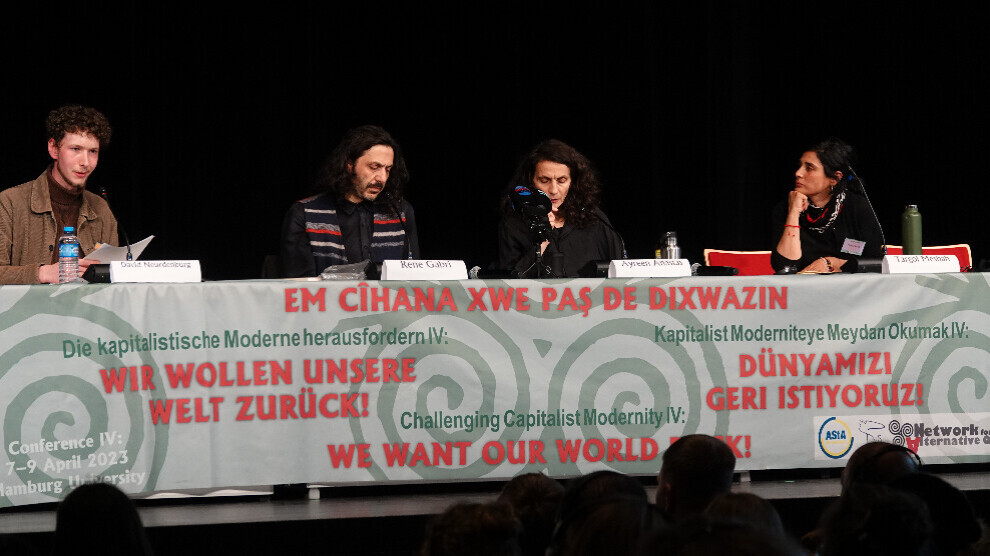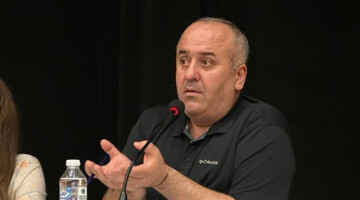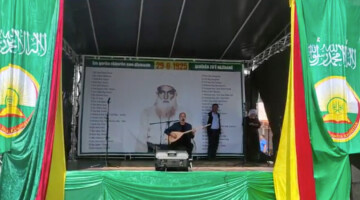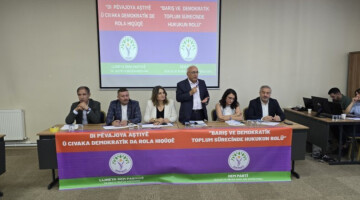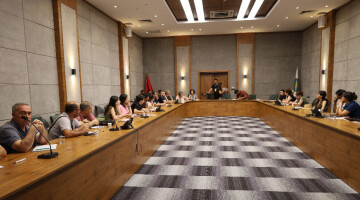The third session at the Hamburg conference, "We want our world back" from the event series "Challenging Capitalist Modernity", opened the second major thematic complex, "Resistance, Reappropriation and Reconstruction" on Friday evening. The session dealt with the statement "Resistance and change begins in art". The thematic complex will be completed on Sunday with a session on education. Ayreen Anastas, Rene Gabri and David Neurdenburg sat on the panel in this session moderated by Targol Mesbah.
The session started with a presentation by archaeology student David Neurdenburg, who was invited to speak at the conference. He criticised classical archaeology for its patriarchal methodology and practice, which, he said, primarily serves the patriarchal capitalist system to implement and stabilise domination. “Thus, archaeology is often only a representation of the succession of ruling systems and empires. This legitimises the state and presents the state system as having no alternative, while at the same time undermining social values,” said As Neurdenburg and cited the archaeological sciences of the Turkish regime, which are a powerful means of erasing Kurdish identity.
Referring to the treatises of Abdullah Öcalan and Murray Bookchin on "democratic civilisation" and the "heritage of freedom", Neurdenburg presented the central role of the understanding of history for free coexistence. He explained the principle of "history from below" on the basis of five criteria:
“History from below explores the lives of working people with a critical view of power and resistance. It is based on the experiences of "ordinary" people and their consciousness and sees it as its task to make the voices of those very people heard in order to enable agency from below. Only the connection to one's own history enables a connection to one's own struggles, because the rulers tried to "suppress our existence from history.”
In his presentation, Neurdenburg reported in detail on the work of the archaeological committee in the Autonomous Administration of North and East Syria (AANES). He had the opportunity to interview the co-chairs of the committee in connection with a research project. In its early days, the main task of the committee was the preservation and protection of historical sites and outreach work in educational institutions. Due to the occupation of the region by the so-called "Islamic State", many cultural sites were looted and destroyed. After the liberation by the Syrian Democratic Forces (SDF), the extent of the destruction became visible. Thousands of artefacts had been sold or destroyed. The committee works closely with the local community to involve and inform larger sections of society about their cultural heritage.
David Neurdenburg ended his presentation by emphasising the importance of local historiography and decentralisation of historical knowledge to demystify the state. For his conclusion, he chose an appropriate quote from Murray Bookchin: "The assumption that what exists today has always existed is the acid that corrodes all visionary thinking."
Afterwards, Ayreen Anastas and Rene Gabri spoke in a joint lecture about a resistant understanding of art and its perspective on the revolution. The classic lecture character was broken up and enriched with participatory methods and metaphorical descriptions. The speakers began their contribution with autobiographical stories about their approach to art. Rene Gabri told of his experience as a child in Los Angeles when he could not speak English and communicated with other children through pictures. As a teenager, he made a film in English class to express himself and his story. Ayreen Anastas talked about a book she had read while studying architecture in Berlin that still inspires her today.
The speakers then explained their critique of the concept of art in capitalist modernism and addressed the division of roles between professional artists and passive viewers and the logic of exploitation and power immanent in this. They said that, in their understanding of art, there are no artists, or rather, everyone can be an artist. They understand art as a gateway to freedom, as a playing field to make another world perceptible and comprehensible and to try out what can exist beyond patriarchy, capitalism, racism and colonialism. Thus, they describe art as a "place of freedom" and an expression of the good life that everyone is looking for.
Rene Gabri then read a text describing the function of the voice as a collective force of community and as an expression of communal character and history. He explained that in every human being, and thus in every voice, there is also a reflection of the turmoil between individualised and industrialised life in the metropolises and resistance in places of autonomy. The text looks at the "Occupy Wallstreet" movement as a concrete example, the places of communal exchange, connection and art at this time. It describes their experience of this movement and the strength that came from the collectivity and re-appropriation of this particularly capitalist locality through resistant culture and movement. This very space, it says, is a place for art, as a way of trying things out and experimenting, of playing with collective perspectives.
At the end, the participants of the conference were included in the programme and asked to produce a sound or a noise for two minutes. This created a collective moment with different forms of expression that made it possible to experience unity and diversity at the same time.
In the following discussion, several points from the presentations were raised. For example, one participant noted that art in the current society was a privilege of a few and that marginalised groups in particular were completely denied access to this form of expression. Forms of expression such as handicrafts and folklore were not perceived as art by society. Moreover, art was often an expression of individualism and did not seek collective solutions.
The discussion round showed how versatile the subject of art can be understood and how much experience is still lacking in this area. Thus, the panel also ended with a call to continue exchanging ideas on this topic.
The conference continues today with decentralised workshops. The programme, which had been prepared over months, had to be changed due to the scandalous cancellation of Audimax by the University of Hamburg under pressure from the Office for the Protection of the Constitution. The conference will continue on Sunday at the Bürgerhaus Wilhelmsburg.

